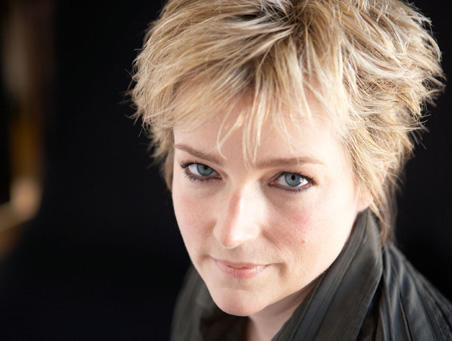
Section Branding
Header Content
Crime Novelist Karin Slaughter Talks ‘Cop Town’ and The Atlanta Child Murders
Primary Content

Crime novelist Karin Slaughter’s neighborhood in Jonesboro, Georgia has a lot to do with her work today. She was a child when the city of Atlanta elected its first black mayor, and during the Atlanta Child Murders when an unknown killer haunted the city.
Slaughter’s latest thriller, Cop Town is set in Atlanta in the 1970s. It’s the story of two female police officers who are sidelined in a citywide search for a cop killer. She sat down with All Things Considered host Rickey Bevington to talk about the novel, her childhood, and the reason she wrote her latest thriller from the point of view of two women.
Interview Highlights:
KARIN SLAUGHTER, author: I’ve always been a writer. I don’t think you choose to be a writer. It chooses you. And I wrote stories all the time when I was growing up. My dad has some of them. I think his retirement plan is to sell them on Ebay. But it’s something that I’ve always been drawn to.
I was a kid in the 1970s when the Atlanta child murders were occurring and even though I live 40 minutes from downtown, it was a very frightening thing as a kid to know that other kids could be targeted and that really gave me an interest in crime. Not just the physical aspects of crime, but what it does to people who are affected by how it changes communities and how it changes people who investigate the crime and who work on it. And it really changed my small town. So that gave me my initial interest in crime stories.
RICKEY BEVINGTON (host, All Things Considered): Why don’t you remind us a little bit about that?
KARIN SLAUGHTER: Well, this was in ‘78, ‘79 I believe. I think in the end, it was around 24 children who were murdered. And Wayne Williams is the presumptive killer, though he was never convicted of killing any children. He was convicted of killing some adults. The police were pretty certain it was him. It was a really frightening time. Not just in Atlanta but everywhere in the metro area and everyone in the country knew about it. It was a scary thing and there were all of these commercials saying “it’s seven o’clock, do you know where your children are?” and it really changed my childhood. Because we went from being able to do whatever we wanted in the summers and play wherever we wanted to not going past certain roads and checking in with our parents at certain times. So, it changed the face of my childhood.
RICKEY BEVINGTON: Cop Town opens in Atlanta in 1974 and tell me about Atlanta at this time. What's happening?
KARIN SLAUGHTER: It was a bit of a wild west. And there was certainly an idea that the good guys were in control and the bad guys were everybody else. It was a fascinating type of change, because we went from being a predominantly white city to predominantly black, which we still are today. One of the things I always tell people up North is “you think we’re sitting around burning crosses and drinking Mint Juleps-- we have the largest African-American middle class of any major American city.” We have these fantastic historically black colleges who give us lawyers and doctors and they like the city so much that they hang around, much to our benefit, I might add. But in 1974, we had mayor named Maynard Jackson. Maynard Jackson was a guy who said, “there’s no black or white, there’s only green.” He really understood money would be this rising tide to raise all votes. And it’s really the history of the city, for me, is turned at this point when Maynard Jackson was in control. He really opened up the city internationally. He was an advocate for the city. And what many people don’t know was he was an advocate for women as well.
RICKEY BEVINGTON: All of these themes come up-- racism, anti-Semitism, homophobia, certainly class issues. Why tell the story through the eyes of women?
KARIN SLAUGHTER: On a very simple level, I’m a woman. I have other series where I write from the point of view of men, but for me, I wanted to tell these women’s stories. Because one of these women is from Buckhead and she has a sort of privileged background and she decides to be a police officer for reasons that are explored in the book. And the other one lives in East Atlanta and she’s a solidly blue collar background. And they get together and they really kind of teach each other by their own social strengths. Maggie, who’s the blue collar person, she understands the streets, she’s been a cop for a long time. Kate --who’s from Buckhead-- she doesn’t have the understanding of the streets. She thinks everybody is wonderful because everyone she’s ever met in her life is wonderful. And the African Americans that she’s dealt with have been at her mother’s art gallery or sitting around the dinner table talking about politics. So, it’s really very eye opening for her to enter the world of the police force. And she gets a glimpse of how the real world is.
Tags: Atlanta, Maynard Jackson, Karin Slaughter, Cop Town, Atlanta Child Murders, Rickey Bevington
